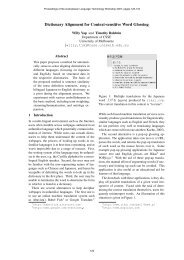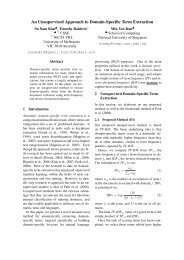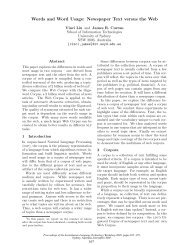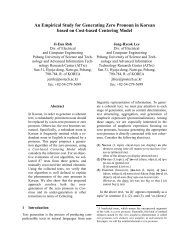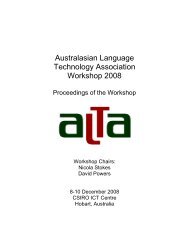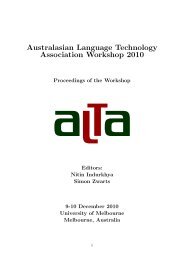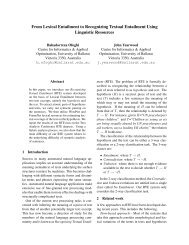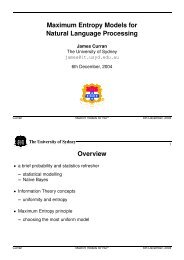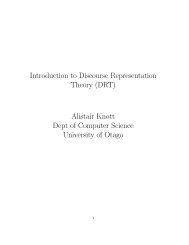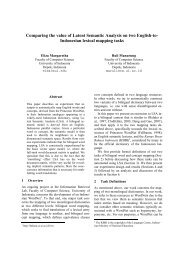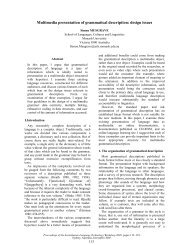Full proceedings volume - Australasian Language Technology ...
Full proceedings volume - Australasian Language Technology ...
Full proceedings volume - Australasian Language Technology ...
You also want an ePaper? Increase the reach of your titles
YUMPU automatically turns print PDFs into web optimized ePapers that Google loves.
an optimal method? Machine translation may benefit<br />
from a systematic investigation into which methods<br />
of human assessment of translation quality are<br />
in fact most reliable and result in most consistent<br />
judgments.<br />
Planning for the future: Two major components<br />
of evaluation are not catered for by current approaches.<br />
The first is the value of longitudinal evaluation,<br />
the ability to measure how much improvement<br />
is occurring over time. Mechanisms that could be<br />
used include: capture of the output of systems that<br />
is not evaluated at the time; strategic re-use of evaluation<br />
data in different events; probably others. In the<br />
TREC context, a long-held belief that systems were<br />
measurably improving is not supported by longitudinal<br />
study, demonstrating the value of such mechanisms.<br />
In other contexts, longitudinal mechanisms<br />
allow meta studies that yield insights that would not<br />
otherwise be available.<br />
Context for judgments: The other omitted component<br />
is sufficient consideration of what might be<br />
called “role”, the persona that the assessor is expected<br />
to adopt as they make their decisions. An<br />
MT system that is used to determine, for example,<br />
whether a statement in another language is factually<br />
correct may be very different from one that is used<br />
to translate news for a general audience. Without<br />
understanding of role, assessors can only be given<br />
very broad instructions, and may have varying interpretations<br />
of what is expected of them. The design<br />
of such instructions needs to be considered with extreme<br />
caution, however, as a seemingly unambiguous<br />
instruction inevitably has the potential to bias<br />
judgments in some unexpected way.<br />
6 Open Questions<br />
Our review of approaches to MT system evaluation<br />
illustrates that a range of questions need to be asked:<br />
• What are the effects of context and specificity<br />
of task on human assessment of translation<br />
quality?<br />
• Can we identify the key “components” annotators<br />
draw on in evaluating translation quality?<br />
Could insights allow us to develop more reliable<br />
evaluation methodology?<br />
• Should we reconsider how conclusions are<br />
drawn from results by taking into account the<br />
degree to which automatic metrics correlate<br />
with human judgments as well as levels of consistency<br />
of those judgments? How do these factors<br />
effect the practical significance of a result?<br />
• What can be done to enhance the reusability<br />
of previous experimental data? Can current<br />
regimes be adapted to testing of new systems<br />
that did not originally participate in particular<br />
experimental rounds?<br />
• Is data being collected now that would allow<br />
retrospective evaluation in ten years, to know if<br />
the state of the art has changed? Similarly, is<br />
it possible to demonstrate with the evaluation<br />
data that MT systems today are better than they<br />
were ten years ago?<br />
7 Summary<br />
Regular competitive evaluation of systems in a common<br />
framework has become widespread in computing,<br />
in areas as diverse as message understanding<br />
and genome assembly. However, at core these evaluations<br />
are dependent on principled, robust measurement<br />
of systems and their ability to solve particular<br />
tasks. Our review has established that there are<br />
significant issues with current approaches to measurement<br />
in MT, and should provide the basis of<br />
development of new approaches that will allow researchers<br />
to be confident of the value of different<br />
MT technologies.<br />
Acknowledgments<br />
This work was funded by the Australian Research<br />
Council.<br />
References<br />
ALPAC. 1966. <strong>Language</strong>s and machines: Computers<br />
in translation and linguistics. A report by the Automatic<br />
<strong>Language</strong> Processing Advisory Committee, Division<br />
of Behavioral Sciences, National Academy of<br />
Sciences, National Research Council.<br />
T. G. Armstrong, A. Moffat, W. Webber, and J. Zobel.<br />
2009. Improvements that don’t add up: Ad-hoc retrieval<br />
results since 1998. In Proc. 18th ACM CIKM<br />
Int. Conf. on Information and Knowledge Management,<br />
pages 601–610, Hong Kong, China, November.<br />
77



